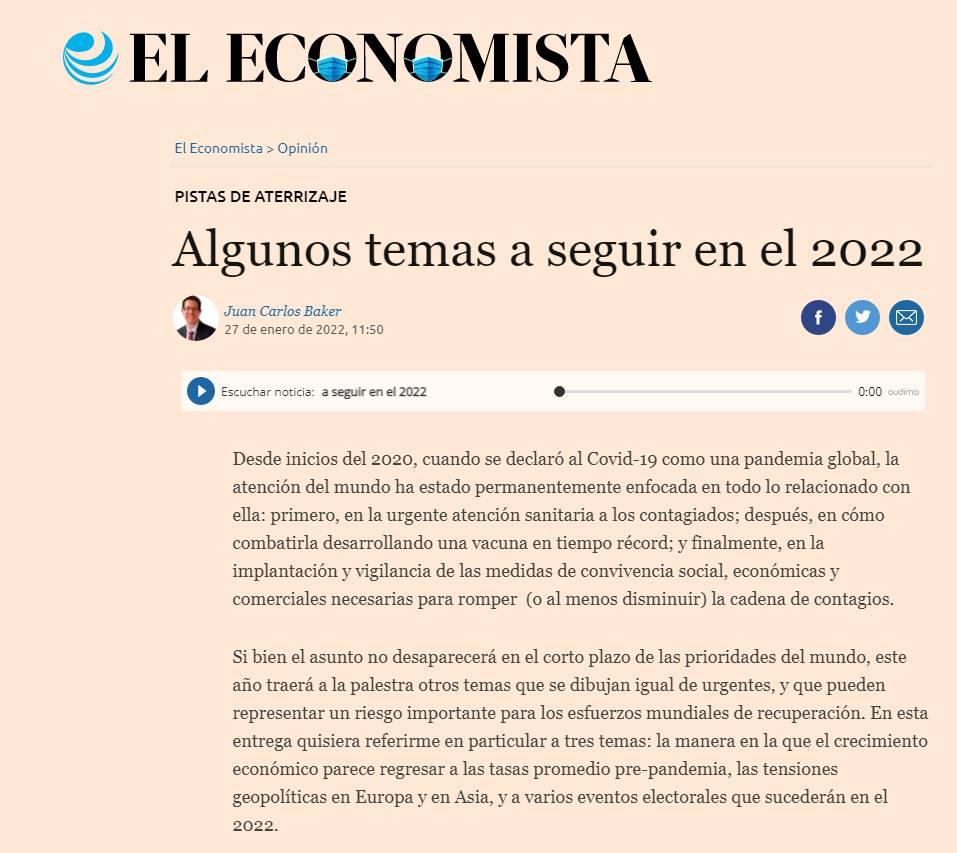Some topics to watch in 2022
Some topics to follow in 2022 |The Economist
Since the beginning of 2020, when Covid-19 was declared a global pandemic, the world's attention has been permanently focused on everything related to it: first, on urgent health care for those infected; then, on how to combat it by developing a vaccine in record time; and finally, in the implementation and surveillance of the necessary social, economic and commercial coexistence measures to break (or at least reduce) the chain of infections.
While the issue will not disappear from the world's priorities any time soon, this year will bring to the fore other issues that appear to be just as urgent, and that may represent a significant risk to global recovery efforts. In this installment I would like to refer in particular to three topics: the way in which economic growth seems to return to the average pre-pandemic rates, geopolitical tensions in Europe and Asia, and various electoral events that will take place in 2022.
Regarding the economy, the International Monetary Fund reduced its projection of world GDP growth for 2022 by half a percentage point, from 4.9% to 4.4%. Among the reasons given are the breakdown of supply chains, world inflation and the possible changes in monetary policy that countries would have to take to attack these problems. Although a growth of 4.4% is not negligible, what is important to note about this reduction is that the huge amounts of money that have been allocated to promote economic growth have not been enough to guarantee a sustained recovery for several years. In the same sense, it is also notable that the high volatility we are experiencing has caused financial institutions to frequently modify their forecasts, so it would not be surprising if these numbers change throughout the year.
If we also consider that governments already have historically high levels of debt, and that a possible tax increase would generate strong reactions of malaise in the population, it is clear that there is less and less space to implement traditional public policies.

This goes hand in hand with geopolitical tensions in Europe and Asia. The possibility that Russia decides to invade Ukraine is quite real, to the point that the United States and the United Kingdom evacuated their diplomatic staff from kyiv. A military conflict in that region would set off a chain reaction, with the United States and its European allies coming under pressure to intervene. Further east, tensions between China and Taiwan have not subsided: just last October, Taiwan's Defense Minister, Chiu Kuo-cheng, warned that China could attempt to retake the island tentatively in 2025.
A large-scale military conflict in either of these two regions would be terrible for the world, due to the potential damage it could cause, including the loss of human life, but above all due to the possibility that the conflict could spread to everyone.
Finally, in 2022 elections will be held in various parts of the world. Without being exhaustive, we highlight the elections in Colombia and Brazil, where the victory of candidates on the left of the electoral spectrum -Lula da Silva in Brazil and Gustavo Petro in Colombia- is anticipated.
Of particular importance to our country, the United States will hold midterm elections in November, where the Democratic party must overcome its internal divisions to aspire to retain control of Congress. Otherwise, President Biden's action will be severely constrained over the next two years, complicating his re-election.
In Europe, the political landscape will be dominated by the presidential election in France, a country that also holds the presidency of the European Union, which will inevitably generate communication vessels between said national process and the decisions taken at the continental level.
In this way, we begin 2022 with an economically weak world and with conflicts that can have very serious consequences. In this context, this year's electoral processes will serve as a thermometer to measure the mood of society and to really determine how much the actions of governments have served to protect an exhausted world with growing needs.
*The author is an academic at the Universidad Panamericana; Prior to that, he spent twenty years in the federal government dealing with international trade negotiations.
Filed in:
OpinionGuest ColumnJuan Carlos Baker
Academic
Landing stripsJuan Carlos Baker is an academic at the Universidad Panamericana. For twenty years he worked in the Ministry of Economy, in the Undersecretary of International Trade Negotiations, of which he was head between 2016 and 2018.
Read more by this author
I don't forget the old year
What's next for North America?
The new US policy towards China is the same
The new US policy towards China is the same
